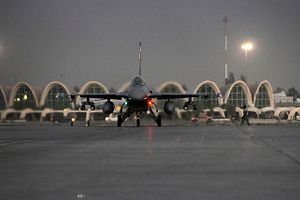Tuesday evening Taliban assaulted the Kandahar airport, an attack that coincided with the opening of the Heart of Asia conference in Islamabad. Afghan President Ashraf Ghani is in Pakistan attending the conference, which seeks to further regional cooperation and is seen as an opportunity for Afghanistan and Pakistan to move toward re-starting (re-re-re-starting?) the peace process aborted earlier this year.
Kandahar, Afghanistan’s second largest city, is a well-know place within the wider war. Positioned in the south, in the heart of Pashtun territory and the Taliban’s traditional stomping grounds, the city continues to host thousands of coalition forces.
While reports are still coming out and many details are unconfirmed, the fighting has died down after nearly 24 hours. The latest AP report cites the Afghan Defense Ministry as saying that 37 people were killed in the attack, including nine of the attackers. Thirty-five people were injured and one attacker, reportedly injured, continues to battle Afghan forces. A doctor at a military hospital told the BBC that they had received 41 bodies, including children, from the attack. The Taliban, as it usually does, offered a likely exaggerated count of fatalities, claiming that 150 were killed.
The Kandahar airport is a large complex with multiple sections. The Afghan National Security Forces and the the NATO-led coalition have bases there, as does the Afghan Air Force. The airport is Afghanistan’s second largest international airport and handles both military and civilian traffic. According to the Wall Street Journal, in early 2015 there were 2,600 coalition troops and about 7,000 defense contractors stationed at the coalition base. Five years ago, coalition forces at Kandahar stood at 26,000.
The attack began shortly after sundown on Tuesday. TOLOnews reported that the attackers were wearing security uniforms. A spokesman for the Governor of Kandahar said Tuesday evening that “the attackers entered Shaheed Padshah School and Teachers Training Center and started attacking the police and army compound.” Sources told TOLOnews that the Taliban entered the airport through its fifth gate, reportedly under tight security, and the BBC reports that “correspondents say the attack is a huge security failure because the attackers were able to smuggle weapons into an area supposed to have been made secure by the Afghan National Security Forces (ANSF).”
Several news outlets reported that the Taliban attackers had taken hostages, though (again) details are flimsy at this point. The New York Times, citing an unnamed Afghan Army officer, reported that “the hostages were believed to be shopkeepers or families living in residential buildings near the airfield.”
As the details of what unfolded in Kandahar solidify the key question will be how the attackers breached the airport’s security — why were they not stopped at the gate? The attack was clearly a suicide mission — sending ten men to assault two military bases can’t be anything but a suicide mission — but it will further chip away at the veneer of stability in Afghanistan. It is easier to stage such an assault than it is to prevent one, but the optics aren’t good for the Afghan security forces or the international coalition which supports them.
Meanwhile, in neighboring Helmand province, TOLOnews reports that an entire district has fallen to the Taliban after heavy fighting. In Herat, in eastern Afghanistan, fighting between rival Taliban factions has forced some residents to flee their homes.
In Islamabad, Ghani attended the Heart of Asia conference, which aims to focus on energy, infrastructure, and investment as part of a larger initiative to support reconstruction efforts in Afghanistan. Part of the Istanbul Process, the conference is a bid to bring the region together around Afghanistan. Tensions between Afghanistan and Pakistan, however, remain an impediment. Pakistan, which many believe has been supporting the Taliban, has proven unable (or unwilling) to make serious efforts to rein them in. The recent fracturing of the Taliban — over the delayed news of Mullah Omar’s death and perhaps again if reports that the new leader, Mullah Mansour, was killed in a recent shootout in Quetta are true — has complicated matters.
Still, Ghani was diplomatic, reportedly saying, “In Afghanistan, there is considerable uncertainty about whether Pakistan truly acknowledges Afghanistan as a sovereign Afghan state with its legitimate government and its legitimate constitution. Your words would go a very long way to assure us in this regard and that opens up the possibility for a sustained dialogue among us.”

































